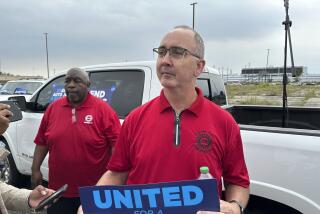‘In a Rebuilding Period’ : Retiring Machinists Chief Says Unions Still Needed
- Share via
WASHINGTON — As he prepares to step down as president of the International Assn. of Machinists this month, William Winpisinger is confident that organized labor has a bright future. But he says he’s worried that union leaders will revert to their old ways when the pendulum of power swings back in labor’s direction.
“I just don’t believe we’re seeing the funeral mass being said over us. I can’t even hear the strains of the organ dirge,” says the outspoken union leader who retires after 38 years in the labor movement. “As long as people work, sooner or later, no matter how benevolent or paternalistic an employer may be, workers run into problems on their jobs. And when they do, they need some kind of mechanism to adjudicate those problems.”
In the absence of some other mechanism for assuring fairness, Winpisinger says, workers will turn to unions for help. “As our tarnished image begins to accept polish again the phone will begin to ring,” he predicts.
Right now, he says, organized labor is going through “just another rebuilding period that we essentially had to go through, partly because of the way we conducted our own institution.” In fact, it is the way that labor conducted itself in the past that concerns him.
‘No Magic to It’
“In my judgment,” he says, “the challenge for labor leadership in the future is one, and one only: When the country does see fit to repose power in the hands of labor leadership that it has to be used more wisely and judiciously than ever in our history. It has to be used responsibly, not recklessly, not wantonly, but very, very responsibly.”
As he sees it, organized labor can no longer use power “totally for its own grand design.” He said he did not agree with the philosophy of the late AFL-CIO President George Meany, who, he says, believed that “the use of unbridled power was not sinful.”
“We’ve got to be prepared to try to discipline ourselves so as not to indulge in the excesses that will cause the pendulum to take another violent swing in the future,” he says. “There’s no magic to it. It takes a lot of work, a lot of persuasion. It takes a hell of a leader.”
To accomplish this, Winpisinger says, labor leaders must spend less time worrying about wages and more time worrying about broader social issues that affect workers. “It’s going to require a leader who can lead on the social and philosophical side as the beacon on which you moderate economic behavior.”
Winpisinger says this doesn’t mean unions should no longer be militant or strike. Citing the example of Eastern Air Lines, where the IAM is locked in a bitter struggle for control of the carrier, Winpisinger says: “Obviously, if someone wants to fight, you’ve got to take them on.”
But Winpisinger sees no room in the future for wage settlements at one firm being goals that unions at other companies or in other industries insist on beating. The result, he says, is “terrible distortions” that “drive the whole wage totem pole out of kilter.” He insists that there must be a recognition among union leaders that some jobs deserve more pay than others.
Winpisinger, who takes pride in being viewed as a leader of labor’s political left wing, cites the experience of unions in Western Europe as the direction U.S. labor go. In Europe, he says, trade unions are part of the mainstream of government policy-making and help set economic goals.
Asked about the future of labor-management cooperation in the United States as American industries scramble to be competitive in world markets, Winpisinger insists that problem is related to the need for labor to have a voice in social and economic policy. And he doesn’t see the effort to be competitive going very far unless business changes its tactics toward labor.
“Cooperation is a two-way street,” he says. “And I don’t consider it cooperation if I sit down on behalf of our members and make a deal . . . and we give up a lot of work rules that may or may not have outlived their usefulness, we put on a good show in terms of production and the company makes a buck and we make a buck.
More to Read
Inside the business of entertainment
The Wide Shot brings you news, analysis and insights on everything from streaming wars to production — and what it all means for the future.
You may occasionally receive promotional content from the Los Angeles Times.










